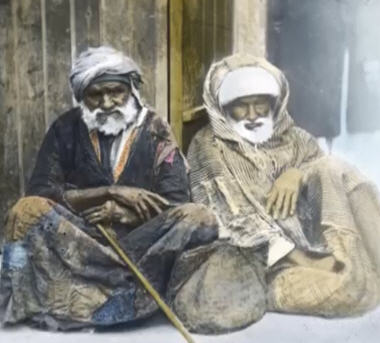The Fate of Two Beggars
兩個乞丐的命運
Once upon a time, there was a generous abbot in a temple. One day, a physically challenged beggar with only one hand begged the abbot. The abbot abruptly pointed to a pile of bricks in front of the door and said to the beggar. "Help me move these bricks to the backyard."
在一座寺廟裡,有一個樂善好施的方丈。有一天,一個只有一隻手的乞丐向方丈乞討,方丈毫不客氣地指著門前的一堆磚對乞丐說:“你幫我把這磚搬到後院去吧。”
The beggar said angrily, "Since I only have one hand, how can I move the bricks? If you don't want to give, why bother humiliating me?"
The abbot then lifted a brick with one of his hands and said. "This task can be done with one single hand!"
The beggar then lifted a brick with one hand as instructed. It took him over two hours to move all the bricks.
“我只有一隻手,怎麼能搬磚呢?你不願給就不給,何必捉弄人呢?”方丈用自己的一隻手搬起一塊磚,說道:“這樣的事一隻手也能做!”乞丐只好用一隻手搬起一塊磚。他整整搬了兩個多小時,才把磚搬完。
The abbot handed some money to the beggar afterwards. He took the money and said gratefully, "Thank you!" The abbot replied, "You don't have to thank me, as this is what you earned for yourself." The beggar said, "I will not forget you. "After that, he bowed deeply and set off on the road.
方丈遞給乞丐一些銀子,乞丐接過錢,很感激地說:“謝謝你!”方丈說:“不用謝我,這是你自己賺的錢。”乞丐說:“我不會忘記你的。 ”說完深深地鞠了一躬,就上路了。
After a while, another beggar also came to the monastery to beg. The abbot took him to the back of the house and pointed to the pile of bricks and said to him, "I shall give you some silver if you moved the bricks to the front yard." But the beggar with healthy hands walked away contemptuously.
過了一會兒,又有一個乞丐來到了寺院乞討。方丈把他帶到屋後,指著磚堆對他說:“把磚搬到屋前就給你一些銀子。”但是這位雙手健全的乞丐卻鄙夷地走開了。
The confused disciple asked the abbot. "Last time you asked the beggar to move the brick from the front to the back of the house; and this time you asked the other one to move the brick from the back to the front of the house. Do you really want to put the bricks behind or in front?"
弟子不解地問方丈:“上次你叫乞丐把磚從屋前般到屋後,這次你又叫乞丐把從屋後搬到屋前,你到底想把磚放在屋後,還是屋前?”
The abbot said to the disciple, "The bricks are indifference whether located in front or behind the house. However, it made a significant difference for the beggars whether they carried out their tasks or not.”
方丈對弟子說:“磚放在屋前和放在屋後都一樣,可搬不搬對乞丐來說就不一樣了。”
A few years later, a decent man with only one hand visited the monastery. He was the beggar who used one hand to move the bricks. Since the abbot gave him the task of moving bricks, he found his own value and then relying on his own hard work, he finally became a rich man. This time he donated a large sum of money to the monastery.
幾年後,一個很體面的人來到了寺院。他只有一隻左手,他就是用一隻手搬磚的那個乞丐。自從方丈讓他搬磚以後,他找到了自己的價值,然後靠自己的拼搏,終於變成了一個富翁。這次他為寺院捐獻了一大筆錢。
As he walked out of the temple, he ran into a beggar begging him. That beggar was a beggar with sound hands, but he is still a beggar.
就在他走出寺院時,他碰到了一個乞丐向他乞討。那個乞丐就是原先雙手健全的乞丐,現在依然還是乞丐。
The abbot said to his disciples at the gate of the temple.
"You see, this is destiny! While our fate lies in our capable hands, we can generate our own happiness and fortune"
方丈在寺院大門口對弟子說:“你看到了吧,這就是命運。命運靠自己掌握,幸福靠自己創造。”
The affluents are not born to be rich, and beggars are not born to be beggars. While wealthy individuals accumulate assets because of their dedication and hard work, the poor become beggars because they only like to enjoy the outcome without putting in the effort. Remember the word of wisdom from the abbot.
富翁不是天生就是富翁,乞丐也不是天生就是乞丐。許多富翁之所以能成為富翁,是因為他們付出了辛勞,許多乞丐之所以會成為乞丐,是因為他們喜歡坐享其成,記住那位方丈的話。
“While our fate lies in our capable hands, we can generate our own happiness and fortune.”
命運靠自己掌握,幸福靠自己創造。

